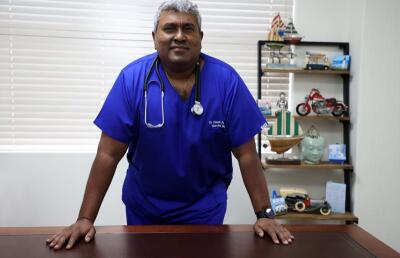Festive Feasting with Caution: Leading vascular surgeon, Dr Vinesh Padayachy, advises moderation to avoid the hidden health costs of holiday indulgences.
Dr Vinesh Padayachy of Durban cautions against the silent dangers of seasonal overeating and the risks it poses to our well-being.
As the festive season approaches, bringing with it a wave of celebrations and feasts, Dr Vinesh Padayachy, a prominent vascular surgeon from Durban, casts a spotlight on the potential health dangers lurking amid our holiday cheer.
Speaking from his practice at the Lenmed Ethekwini Hospital and Heart Centre, Dr Padayachy warns of the risks associated with the traditional surge in consumption of sugary and carb-heavy foods during this time of year.
“The festive season often encourages indulgence in rich foods and decreased physical activity,” Dr Padayachy said, identifying a combination that could lead to increased blood glucose levels and significant weight gain.
With a particular concern for the pre-diabetic and obese populations, he notes that such indulgences could precipitate the onset of diabetes and exacerbate existing health issues.
Dr Padayachy points out that binge eating and heavy drinking during the festivities can cause acute spikes in blood sugar, leading to hyperglycaemia.
“These short-term lapses can set the stage for long-term battles with the disease,” he cautions, emphasizing the increased risk of heart disease, nerve damage, and other diabetes-related complications.
The surgeon also challenges the perceived safety of “zero sugar” alternatives, which are often laden with artificial sweeteners. He says these can still affect insulin sensitivity and may encourage overconsumption due to a false sense of allowance.
With the holiday season’s propensity to normalise overconsumption, Dr Padayachy urges the public to be mindful of the “hidden health costs” of festive treats.
He highlights the industry’s role in marketing these products, which can make it difficult to resist the temptation to indulge.
Physical activity, a key element in managing diabetes, is another victim of the holiday period’s excesses. Dr Padayachy expresses concern about the decline in physical activity during December, which contributes to insulin resistance and can be detrimental to those with diabetes.
Moreover, Dr Padayachy draws attention to the intersection of mental health and eating habits during the festive season.
“Depression and anxiety can trigger emotional eating,” he says, pointing out that this often involves foods high in sugar and fat, which can lead to worsened physical health and diabetes management.
To combat these risks, he recommends a proactive approach, including exercise, meditation, seeking social support, and engaging in hobbies.
He advises those struggling with dietary choices to make smart decisions, such as opting for healthier versions of traditional dishes, limiting portions, and resisting peer pressure to overeat or drink excessively.
Dr Padayachy also emphasises the role of family support in creating an environment that encourages health-conscious habits and group physical activities. He suggests that staying active can include family walks, holiday-themed fitness challenges, or even active indoor games.
As the holiday season draws near, his message is clear: moderation and vigilance are key. He encourages a festive period that is both merry and health-conscious, and urges the public to celebrate in ways that enrich rather than endanger our health.
IOL News

